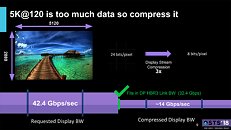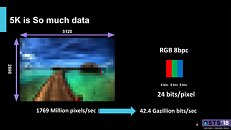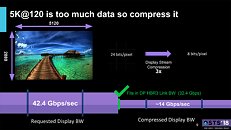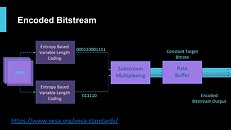Tuesday, October 2nd 2018

Intel Gen11 "Ice Lake" iGPU Supports DisplayPort 1.4a and DSC Enabling 5K and 8K
Intel processor integrated graphics will get its first major hardware update in 4 years since Gen 9.5 "Skylake," with the introduction of the Gen11 architecture that debuts with the company's "Ice lake" processors. The company confirmed in an XDC 2018 conference presentation that the iGPU will support DisplayPort 1.4a along with VESA DSC (display stream compression), enabling it to support display resolutions as high as 5K (5120 x 2880 pixels) with 120 Hz refresh-rate.
Without DSC, 5K-120 Hz requires 42.4 Gbps of bandwidth (not counting interconnect and protocol overheads), which even DisplayPort with HBR3 cannot provide, as it caps out at 32.4 Gbps. DSC offers "visually lossless" compression of the 5K-120 display stream down to roughly 14 Gbps, which can be comfortably handled by DisplayPort 1.4a. 8K (8192 x 4320 pixels) at 60 Hz also becomes possible. Merely supporting these new high resolutions doesn't imply Gen11 iGPUs can game at those resolutions. Support for them is necessitated by rapid increases in resolutions (pixel densities) and refresh-rates of high-end notebooks and ultra-portable devices.The complete slide-deck follows.
Without DSC, 5K-120 Hz requires 42.4 Gbps of bandwidth (not counting interconnect and protocol overheads), which even DisplayPort with HBR3 cannot provide, as it caps out at 32.4 Gbps. DSC offers "visually lossless" compression of the 5K-120 display stream down to roughly 14 Gbps, which can be comfortably handled by DisplayPort 1.4a. 8K (8192 x 4320 pixels) at 60 Hz also becomes possible. Merely supporting these new high resolutions doesn't imply Gen11 iGPUs can game at those resolutions. Support for them is necessitated by rapid increases in resolutions (pixel densities) and refresh-rates of high-end notebooks and ultra-portable devices.The complete slide-deck follows.
























27 Comments on Intel Gen11 "Ice Lake" iGPU Supports DisplayPort 1.4a and DSC Enabling 5K and 8K
Anyone can confirm that?
Good, finally a new Intel IGP, I hope it gets a better driver than the older ones, at the very least as a testing ground for Arctic Sound. It would be great to see if they could somehow fight the APU R7 ones, but that seems unlikely.
Even if it is 10 ms, that adds up, on top of the other gazillion ms lost here and there.
Not that anyone will game on an intel gpu in 5k, but maybe this tech will be enabled for lower resolutions also.
But I understand others will be forced to use the same tech for high resolution displays, which is not cool.
oh well ... my TV is 1080p 32", my monitor is 1620p 32" ... i don't even have (or need ) 4k anytime soon (maybe for the TV)
And even for a monitor situation 4K is hard to really make use of. Higher res is diminishing returns and exponentially increasing requirements. And then there is the content problem where most of it is just upscaled 1080p or worse.
not even fully ready for 4K, already talking about 5k and 8k ... talk about some priorities ...
also my 32" 1620p goes fine in 1080p when i am using my Odroid C2 with Kodi ... that remind me that i should set up the GPU mod list for 1440p60 or 1620p60 since atm it's only going up to 1080p60
Intel can't even get their 10nm CPU process to work for shit (not to mention 7nm), but here they are apparently working on giving us iGPU's with updated capabilities which they should have had 4 years ago..... WTF ?
And yes I know making CPU's and iGPU's are 2 different (but similiar) processes, but still this seems their priorities are a bit out of whack here, unless I'm just missing something...
however, this statement "Merely supporting these new high resolutions doesn't imply Gen11 iGPUs can game at those resolutions" is very deceptive at best, downright stupendous at worst IMHO.....
Bah nevermind looks like you need at least the 2017 MBP to drive 2 5Ks.